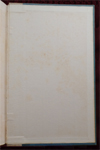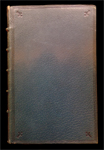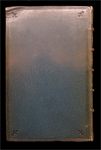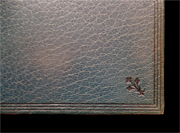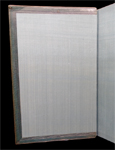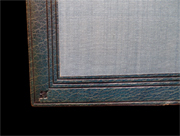100th
MP

|
THE
100th
MONKEY
PRESS |
|
|
|
Limited Editions by Aleister Crowley & Victor B. Neuburg |
|
Bibliographies |
|
Download Texts
»
Aleister
Crowley
WANTED !!NEW!!
|
|
THE MOTHER’S TRAGEDY |
|
Image Thumbnails |
||||||||||||||||||||
|
Title: |
The Mother’s Tragedy and Other Poems. |
|
||||||||||||||||||
|
Variations: |
|
|||||||||||||||||||
|
Publisher: |
Privately Printed.1 |
|||||||||||||||||||
|
Printer: |
|
|||||||||||||||||||
|
Published At: |
London.1 |
|||||||||||||||||||
|
Date: |
circa July 1901.7 |
|||||||||||||||||||
|
Edition: |
1st Edition. |
|||||||||||||||||||
|
Pages: |
xii + 111.1 |
|||||||||||||||||||
|
Price: |
Priced at 5 shillings.1 |
|||||||||||||||||||
|
Remarks: |
Crowley had the original holograph manuscript for The Mother's Tragedy bound by Zaehnsdorf in light blue crushed levant morocco with a half morocco slip case.4 The volume The Temple of the Holy Ghost was, at the publisher's suggestion, split up into The Mother’s Tragedy and The Soul of Osiris.5 It has been suggested that a large number of the original 500 printed copies were later bound and issued in 1907 under Crowley's Society for the Propagation of Religious Thought (S.P.R.T.) imprint.6 Crowley was disappointed with Kegan Paul's management of his book sales and closed his account with them in May of 1904. Between 1902 and 1904, Kegan Paul had not managed to sell any copies of The Mother's Tragedy.7 |
|||||||||||||||||||
|
Pagination:2 |
|
|||||||||||||||||||
|
Contents: |
- Prologue: Sin: An Ode - The Mother’s Tragedy - The Fatal Force - The Summit of the Amorous Mountain - The Mother at the Sabbath - The Bridegroom - The Course of True Love - Madonna of the Golden Eyes - Conventional Wickedness - Mora Janua Amoris - Sidonia the Sorceress - The Whore in Heaven - The Lesbian Hell - The Reaper - The Lord’s Day - The Growth of God - Love’s Wisdom - The Pessimist’s Progress - Nephthys - Against the Tide - Styx - Epilogue—A Death in Thessaly |
|||||||||||||||||||
|
Author’s Working Versions: |
|
|||||||||||||||||||
|
Other Known Editions: |
|
|||||||||||||||||||
|
Bibliographic Sources: |
|
|||||||||||||||||||
|
Comments by Aleister Crowley: |
The Mother’s Tragedy seems to have been influenced by Ibsen, with a touch of Bulwer Lytton. — The Confessions of Aleister Crowley. New York, NY. Hill and Wang, 1969. Page 190. ______________________________
There remain my narrative and dramatic books on love. The Tale of Archais is simply jejune; I apologize and pass on. The Mother’s Tragedy, “The Fatal Force”, Jezebel, Tannhäuser, all treat love not as an object in itself, but on the contrary, as a dragon ready to devour any one less than St. George. — The Confessions of Aleister Crowley. New York, NY. Hill and Wang, 1969. Page 556-557. |
|||||||||||||||||||
|
Reviews: |
It is not long since we reviewed in these columns what we believed to be the first book of a new poet. “The Soul of Osiris” possessed the fullest promise, and now we have before us another volume from the same pen. We should say from internal evidence that there is but a small interval of time between the two books: they for all intents and purposes belong to each other, the only difference being one of subject. In “The Soul of Osiris” the subject-matter was very frequently of quite an extravagant character, with now and then poems which were free from any extravagance at all, but full of true poetic fire. In the present volume we likewise find a similar condition of things, but here the subject-matter is even more extravagant, and were it not for its treatment we should say extremely unpleasant. Mr. Crowley has courage, and is not to be deterred from frankness by any possible or impossible demand of conventionality. Most of our great poets, particularly our great dramatic poets, have dealt with subjects with which the subject of “The Mother’s Tragedy” is allied; but in this new drama its author has gone much further than either Aeschyius or Shelley even, and the horror of the whole thing is tremendous indeed. We feel, therefore, that our estimate of the quality of Mr. Crowley’s poetry is a correct one, for with any treatment short of that to be expected from a true poet, such a subject as that treated of in “The Mother’s Tragedy” would be nothing but nauseous. As it is, it is of the essence of great tragedy. We cannot say more of it now; but we still look forward to a still, quiet, and calm volume of poems from Mr. Crowley’s pen by which he may be more definitely judged than is possible with these turgid, fiery efforts of a young poetic ebullience. —Birmingham Daily Gazette, 24 September 1901 ______________________________
Mr. Aleister Crowley is a poet who is apparently under the obsession of an esoteric view of life and human destiny. He endeavours to grapple with the dark problems which exercised the imagination of John Ford. He views the sexual problem from the standpoint of an unconventional student of human nature. His creed is a singular mixture of belief in Osiris and in Christ. The principal poem in his new volume is a powerful dramatic sketch ending in something like a tragic farce. The love of a man for his own mother, not according to a moral but a sexual standard, is not quite a novel idea, but Mr. Crowley handles the subject in a revolting fashion, which the Greek poets avoided, owing to their keen artistic sensibility. Some passages in this drama are really very fine; and “The Fatal Force” is also a dramatic poem of singular power, though the subject is equally horrible. There is scarcely a poem in the entire volume free from morbidity; and yet it is impossible to deny that Mr. Crowley has a claim to recognition as a true poet. Most men who have thought deeply on life’s problems recognise that the current religion of nearly all their fellow men is an idle mockery. The relations of men and women, as well as the constitution of states and families, are based largely on organised lies. We cannot shrink from looking behind the veil, and asking ourselves—What is life at best? Is it materialism and obscenity? or is it a sickening comedy in which nobody cares whether the consequences of his actions are injurious to others or not? Mr. Crowley seems to hold that the world is reeking with rottenness—and he is, to a great extent, right. His poems, “Mors Janua Amoris” and “The Whore in Heaven,” will horrify the votaries of Mrs. Grundy. At the same time, these daring verses contain a large share of elementary truth. But we live in a hypocritical age, and apparently the author of these extraordinary poems realises the fact, for his volume is “privately printed.” The epilogue, “A Death in Sicily,” is really a magnificent poem—pagan in its intensity and vividness of colouring; but the prudes who think nakedness impurity and who abjectly fear death will denounce this really gifted poet as “immoral.” —Westminster Review, October 1901 ______________________________
He endeavours to grapple with the dark problems which exercised the imagination of John Ford. He views the sexual problem from the standpoint of the unconventional student of human nature. . . . The principal poem in his new volume is a powerful dramatic sketch . . . passages in this drama are really very fine; and “The Fatal Force” is also a dramatic poem of singular power. Mr. Crowley has a claim to recognition as a true poet. Most men who have thought deeply on life’s problems recognize that the current religion of nearly all their fellow men is an idle mockery. . . . We cannot shrink from looking behind the veil, and asking ourselves—What is life at best? . . . Mr. Crowley seems to hold that the world is reeking with rottenness—and he is, to a great extent, right. . . . These daring verses contain a large share of elemental truth. But we live in a hypocritical age, and apparently the author of these extraordinary poems realizes the fact, for his volume is privately printed. . . . Magnificient poems—pagan in their intensity and vividness of colouring. —Oxford Magazine, date unknown. ______________________________
The author of these verses is apparently consumed with the desire to produce the sensation of nausea in his readers: but fortunately the luckless reviewer, if he have the least sense of humour, will be saved by the portentous absurdity of the stuff presented to him. Perhaps the following sample is sufficient:—
Thrice, in the Vault of Hell, my Word was born, Abortive, in the empty wilderness. False echoes, made malicious, turn to scorn The awful accents, the Supreme address. The Fourth, the final Word! All Chaos shrank and heard The terror that vibrated in the breath. Hell, Death, and Sin must hear, Tremble and visibly fear, Shake the intangible chain that hungereth. That Mother of Mankind Sprang in the thunder-wind! The strong words bind For evermore, Amen! the keys of Hell and Death.
"Igsplain this, men and angels!" we might cry with Mr. Yellowplush, if we had the least curiosity with regard to it. The least unfavourable thing that we can say of this volume is that it is privately printed: we should gladly have omitted even this censure. —Oxford Magazine, 4 December 1901. ______________________________
Invidious as it may seem to deal hardly with a privately printed book, courteously sent for review, this volume demands an emphatic protest from all lovers of literature and decency. Dedicated by as much as is comprehensible of the prologue to the suggestive exposition of the obscene, it never deviates for one moment from its appointed task. If, however, to the clean-minded man the book is revolting, to the artist it is a monstrosity. Such thoughts as may lurk between its covers are, fortunately, concealed in such a maze of intricate verbiage, that it is only here and there that we catch a glimpse of the horrors that lie behind. —The Cambridge Review, date unknown. ______________________________
Mr. Crowley is a kind of middle-class Swinburne at second hand, without the scholarship, without the splendid phrase, without the ardour of beauty. He has a certain rhythmical fluency, and in that statement all his literary merits are summed up. If the reader can form a conception of a wind-bag foaming at the mouth, he will get some notion of “The Mother’s Tragedy,” and other Poems (privately printed). Even this mixed metaphor will not convey to him the morbid unpleasantness of Mr. Crowley’s taste in subjects. “The Mother’s Tragedy” is a drama of incest, crudely and violently treated. Some of the shorter poems are worse. —The Athenaeum, 31 August 1901. ______________________________
It is not long since we reviewed a book by Mr. Aleister Crowley, and mingled blame with praise, like “Crusty Christopher.” So we must still do; for The Mother’s Tragedy treads too hard on the heels of his previous volume for any modification of the qualities we then noted. There is the old vigour and boldness, the sinewy phrase that takes you by the throat (as it were) and throttles the praise out of you; but also is it incompt, wild, shattering of form, unskilful in coherent expression, profuse in awkward and misleading constructions as of old. For many of these poems there is no word but powerful; yet it is (we might almost say) the power of insanity, so little is it under the author’s own control, co contorted and spasmodic is it, proceeding by vehement leaps and rushes of speech, abruptly checked by thick and struggling utterance. Often admirable in forceful felicity, it is equally often exasperating by its choked and imperfect expression. Withal there is thought; it is turbid with meaning, only too turbid at many times. Yet this is a fault on the right side. We would rather wrestle with Mr. Crowley’s obscurity (and he is often densely, faultily obscure, through trying to say more in a line than he has the gift to say) than wade through the tepid vacuity of most minor verse. The worst of all obscurity is the obscurity of utter nothingness and voluble, brainless platitude. All Mr. Crowley’s qualities, for good and evil, are quintessentialised in the opening ode, called “Sin.” It deals with the spirit of the heathen and mythological hell—the place of intense cold and negation of life, the source of lust and death. The poem only too manifestly reveals its own effort; it is often turgid with effort, clumsy with unshapely compression; it is obscure in substance, and frequently still more obscure from broken and disconnected utterance, want of logical grammar—all the faults of those who seek pregnancy without adequate artistic gift. Yet its sheer power constantly makes way through the dead weight of its defects; while it is throughout grave and dignified. The poet always knows what he is saying, though the reader may often desperately wish that he did. It is too to quote entire; but, at the risk of utter unintelligibility, we venture to cite some stanzas from it:
Ye rivers, and ye elemental caves, Above the fountains of the broken ice, Know ye what dragon lurks within your waves? Know ye the secret of the cockatrice? The basilisk whose shapeless brood Take blood and muck for food? The sexless passion, the foul scorpion spawn? The witches and the evil-chanting ones Who strangle stars and suns, Eclipse the moon, and curse against the dawn? Know ye the haunts of death? The hole that harboreth The sickening breath, Whence all disease is bred and all corruption drawn?
. . . . . . . . .
Central, supreme, most formidable Night, Gathered its garments, drew itself apart, Gaunt limbs appear against the coprolite Veil of deep agony, display the heart; Even as a gloomy sea Wherein dead fishes be, Poisonous things, nameless, the eightfold Fear, Misshapen crab and worm, The intolerable sperm, Lewd dragons slime-built, stagnant; the foul mere Crawled, moved, gave tongue, The essential soul of dung That lived and stun, That spoke—no word that living head may hear.
. . . . . . . . .
Yet, in the terror of that Beast, abides So sweet and deadly a device, a lure Deep in the blood and poison of her sides, Swart, lean, and leprous, that her stings endure. Even the soul of grace Abideth not her face Without vague longing, infinite desire, Stronger because suppressed, Unto the wide black breast, The lips incarnate of blood, flesh, and fire
Mr. Crowley, we may add, frequently expresses things with all his uncompromising completeness, which poetry (to our mind) had better leave unexpressed. —The Academy, 26 October 1901 ______________________________
Of “Aleister Crowley’s” gloomy but indubitable talent we shall speak more fully on another occasion. A second volume, privately printed, by the author of ‘Osiris,’ shows the same qualities of excessive morbidness and of precise expression of mood that were shown in the earlier volume. No English writer has so nearly reproduced the mood of Baudelaire, and whether this is a commendable achievement or not, it is too uncommon and distinguished a quality to pass unnoticed. Some idea of Mr. Crowley’s exceptional lyrical gift may be had from the opening chorus of “The Mother’s Tragedy.”
THE SPIRIT OF TRAGEDY
Here, in the home of a friend, Here, in the mists of a lie, The pageant moves on to the desolate end Under a sultry sky Noon is upon us, and Night, Spreading her wings unto flight, Visits the lands that lie far in the West, Where the bright East is at peace on her breast: Opposite quarters unite. Soon is the nightfall of Destiny here ; Nature’s must pass as her hour is gone by. Only another than she is too near, Gloom in the sky. One who can never pass over shall sever Links that were forged of Love’s hand; Love that was strong die away as a song, Melt as a cable of sand.
—The Evening Post, 23 August 1901. ______________________________
If ever you find you are getting too gay and cheerful and want a veritable extinguisher of joy, just take about two fingers of the following quintessence of gloom, for which Aleister Crowley is responsible, before going to bed:
THE SPIRIT OF TRAGEDY
Here, in the home of a friend, Here, in the mists of a lie, The pageant moves on to the desolate end Under a sultry sky Noon is upon us, and Night, Spreading her wings unto flight, Visits the lands that lie far in the West, Where the bright East is at peace on her breast: Opposite quarters unite. Soon is the nightfall of Destiny here ; Nature’s must pass as her hour is gone by. Only another than she is too near, Gloom in the sky. One who can never pass over shall sever Links that were forged of Love’s hand; Love that was strong die away as a song, Melt as a cable of sand.
—The Minneapolis Tribune, 31 August 1901. ______________________________
Mr. Aleister Crowley is surely going to be the next idol of the people who have been worshiping Browning. Mr. Crowley has already secured quite a following in England, and it is therefore a question of only a short time when he will have people over here guessing. The New York Evening Post has already spoken of his “indubitable talent,” and quotes the following as evidence of his “exceptional lyric gift”:
THE SPIRIT OF TRAGEDY
Here, in the home of a friend, Here, in the mists of a lie, The pageant moves on to the desolate end Under a sultry sky Noon is upon us, and Night, Spreading her wings unto flight, Visits the lands that lie far in the West, Where the bright East is at peace on her breast: Opposite quarters unite. Soon is the nightfall of Destiny here ; Nature’s must pass as her hour is gone by. Only another than she is too near, Gloom in the sky. One who can never pass over shall sever Links that were forged of Love’s hand; Love that was strong die away as a song, Melt as a cable of sand. But I am watching, with unwearied eye, The wayfare of the tragedy. I see the brightness of the home; I see The grisly phantom of despair to be. I see the miserable past redeemed, (Intolerable as its purpose seemed,) Redeemed by love: I see the jealous days Pass into sunshine, and youth-beaming rays, Quicken the soul’s elixir. Let me show How these air-castles tumble into woe.
We are ready to admit right here that Crowley is right. We can’t understand what he is driving at, hence it will be idle to question his supremacy as an artist. —The Evansville Journal, 2 September 1901. ______________________________
AN AWFUL BOOK.
The Noted Chevalier O'Rourke Out-Swinburnes Swinburne.
When the Chevalier O'Rourke was in Mexico we thought him Awfully Simple; now he has written a Poem which shows he is Simple Awful. So is the Poem. It is so Morally Unhealthy that it had to be quarantined on the Way to the land of the Aztecs: and of so Burning a Nature that the Covers are of Asbestos, and it Carries a Fire Insurance Policy. It is a Book which no Self Respecting Girl would permit her Mother to read: and One which few real Respectable men would permit themselves to Overlook. The Chevalier O'Rourke is the Stage Name of the English Importation who answered to the Cognomen of Aleister Crowley in the Home of Shamrock II, and who first Stampeded the public of San Francisco Lane by his Inimitable Combination of Knickerbockers, Long Hair, and Inseparable Pipe, and a general Bug-House Make-up. His After-Celebrity came when, with an Alpenstock and his man Friday Eckenstein, he trampled the snowy Breast of Ixtaccihuatl, and chewed bits of the Alabaster Neck of the White Lady, to Quench his Burning Thirst. Previous to That he had Prolonged the Horrors of the Spanish-American Pleasantness by a Book of Greeting to the New Republic, which has since Been equaled in its effect only by the long Drought in the Corn Belt and the Steel Strike. But his latest Riot of Rhyme has the War Production Beat a Mile, and Then Some, with the Decameron of Bocaccio Away Back in the Ruck, and Ella Wheeler Wilcox on ice among the Also Rans. It is so bad that the Author is afraid to Read it Again, lest he be corrupted. In short, it is Destined to be Among the Most Popular Books of the Season. The Effervescence is Called "The Mother's Tragedy and Other Poems." The "and Other Poems" belong just a block beyond where the trolley stops for "Mother's Tragedy" in Spotted Town. The Chevalier Evidently becomes Intoxicated with the Exuberance of his own Verbosity and seeks to Give Artistic Versimilitude to an otherwise Bald and Unconvincing Narrative. He gets There on All Fours with the Verisimilitude, even if the Art is lacking. "And Other Poems" made the Book so Bad that the Chevalier had to Print it Privately, and the Name of the Printer is as completely Lost as Teddy Roosevelt. Dr. A. W. Parsons is among those in the city who believed in the literary ability of the Chevalier, and to him the author has sent a copy of his book. The doctor compares the general work of the Chevalier to that of the poet Swinburne, for in his better moods he has brought out some of the sweetest songs of love and nature, but his last production seems in a class of badness by itself. "The Mother's Tragedy" is the story of an illegitimate son who has been reared in ignorance of the identity of his parents. In time he falls in love with his own mother, whose fondness for her son restrains her from telling him the degrading story of his birth, and he forces the conclusion by a proposal of marriage to his mother. He raves in scenes of beautiful depths of love when she in agony refuses his suit. She is finally compelled to reveal the awful truth to her son to prevent his self-destruction. The denouement is heart-rending. —The Mexican Herald, 18 August 1901. |
|||||||||||||||||||


